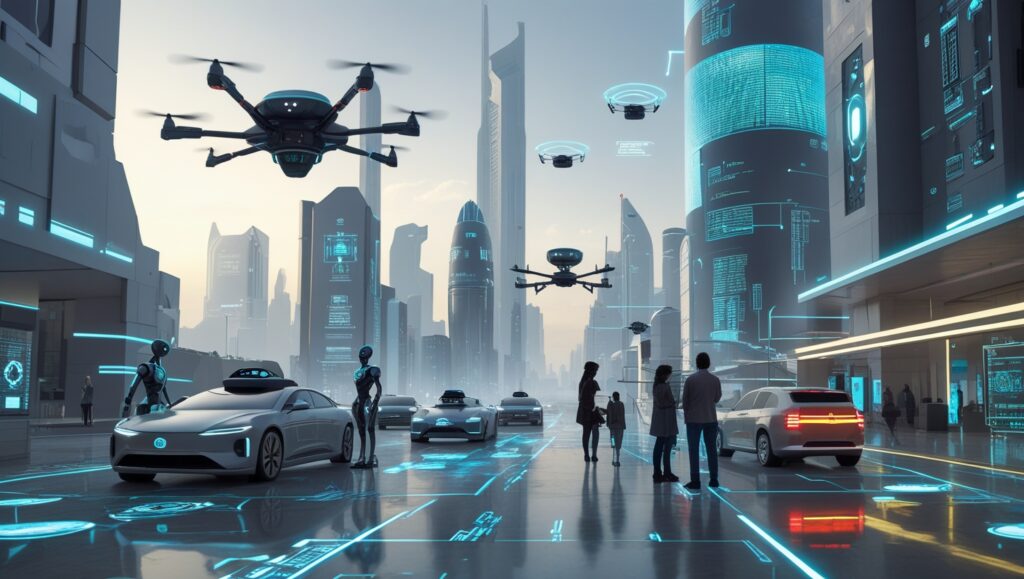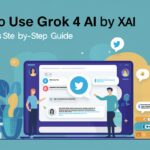Introduction: Why Artificial Intelligence Trends Matter in 2025
Artificial Intelligence (AI) is no longer just a futuristic idea. It’s here, and it’s changing how we live, work, and interact with technology. From chatbots to medical diagnosis tools, AI is everywhere.
In 2025, AI is expected to grow even more. But it’s not just about more machines—it’s about smarter, more useful technology that understands humans better than ever before.

In this blog post, we’ll look at the Top 10 Artificial Intelligence Trends to Watch in 2025, explained in simple English. Whether you’re a student, business owner, or just curious, this guide will help you understand what’s coming next in the world of AI.
Table of Contents
Trend #1: AI-Powered Personal Assistants Are Getting Smarter
You may already use assistants like Siri, Alexa, or Google Assistant. In 2025, these tools are becoming much smarter and more helpful.
They won’t just answer basic questions—they’ll understand your habits, make smart suggestions, and even handle tasks for you, like booking appointments, sending emails, or helping you shop online.
New AI assistants can even understand emotions through your voice or text, making conversations feel more human.
Trend #2: Generative Artificial Intelligence Is Transforming Content Creation
Generative AI tools like ChatGPT, DALL·E, and Sora are helping people create blogs, videos, music, and art faster than ever before.
In 2025, generative AI will:
- Write blogs and social media posts
- Create images, videos, and even full movies
- Generate music and voiceovers
- Assist in coding and software development
Businesses are using it for marketing, education, and customer support. Even small businesses and content creators can now compete at a global level with the help of generative AI.
Trend #3: Artificial Intelligence and Healthcare: Smarter Diagnosis and Treatment
AI is making healthcare smarter, faster, and more accurate.
Doctors are using AI tools to:
- Detect diseases early (like cancer or heart problems)
- Suggest treatment plans based on medical history
- Monitor patient health in real-time using smart devices
AI is also helping with mental health, offering chatbot therapy sessions or emotional support tools.
By 2025, AI could reduce hospital wait times, improve diagnosis, and save lives.
Trend #4: Edge Artificial Intelligence: Bringing Intelligence Closer to Devices
Most AI today runs in the cloud (online servers). But in 2025, more AI will run directly on devices like phones, cameras, and smartwatches. This is called Edge AI.
Why is this important?
- It’s faster because there’s no need to send data to the internet
- It’s safer because your personal data stays on your device
- It works offline, even without internet
Edge AI will power smarter homes, wearables, cars, and factory machines.
Trend #5: AI in Cybersecurity: Fighting Smarter Threats
Cybercrime is growing. Hackers are using AI—so defenders need it too.
In 2025, AI will protect us by:
- Detecting unusual activity (like hacking attempts)
- Blocking threats before they cause harm
- Predicting future cyberattacks using data patterns
AI tools will also help businesses protect customer data and follow privacy laws better.
Trend #6: Explainable AI: Making AI Decisions More Transparent
One big problem with AI is that it sometimes feels like a “black box.” It gives answers, but we don’t know how or why.
In 2025, Explainable AI (XAI) is changing this. These tools help humans:
- Understand how AI made a decision
- Trust the results
- Fix errors or biases
This is especially important in banking, healthcare, law, and government, where AI decisions must be clear and fair.
Trend #7: AI in Education: Personalized and Efficient Learning
AI is becoming a powerful tool for teachers, students, and schools.
By 2025, AI will:
- Create personal learning plans based on a student’s pace and style
- Help teachers with grading and class planning
- Translate lessons into multiple languages
- Provide virtual tutors available 24/7
Education will become more accessible, especially for remote or rural students.
Trend #8: AI and Robotics in Daily Life
AI-powered robots are not just in factories—they’re coming to our homes, restaurants, and hospitals.
By 2025:
- Home robots can clean, cook, or help elderly people
- Retail robots can manage stores and deliver packages
- Medical robots assist in surgeries and patient care
These robots are becoming more affordable, friendly, and useful thanks to advances in AI.
Trend #9: Regulation and Ethical AI Development
With AI growing fast, many governments are creating new rules and laws to make sure it’s used safely and fairly.
In 2025, we expect:
- AI regulations to protect user privacy
- Laws to stop bias in AI decisions (like hiring or loans)
- Transparency rules for AI companies
These efforts aim to build trust between humans and machines.
Trend #10: AI for Climate Change and Sustainability
AI is also helping to save the planet.
By 2025, AI tools are being used to:
- Predict weather and climate patterns
- Reduce waste and improve recycling
- Save energy in homes and factories
- Monitor forests, oceans, and air pollution
AI helps companies make eco-friendly choices, and governments use it to plan for natural disasters.
Conclusion: The Road Ahead for AI in 2025
Artificial Intelligence in 2025 is more than just a buzzword. It’s a powerful, practical tool that’s improving our lives in many ways. From healthcare and education to cybersecurity and climate protection, AI is everywhere—and it’s evolving fast.
But with great power comes great responsibility. As AI becomes smarter, we need to make sure it’s also safe, fair, and ethical. Governments, businesses, and users all have a role to play in shaping this future.
If you want to stay ahead, watch these top 10 AI trends in 2025. They are not just changing technology—they are changing the world.

